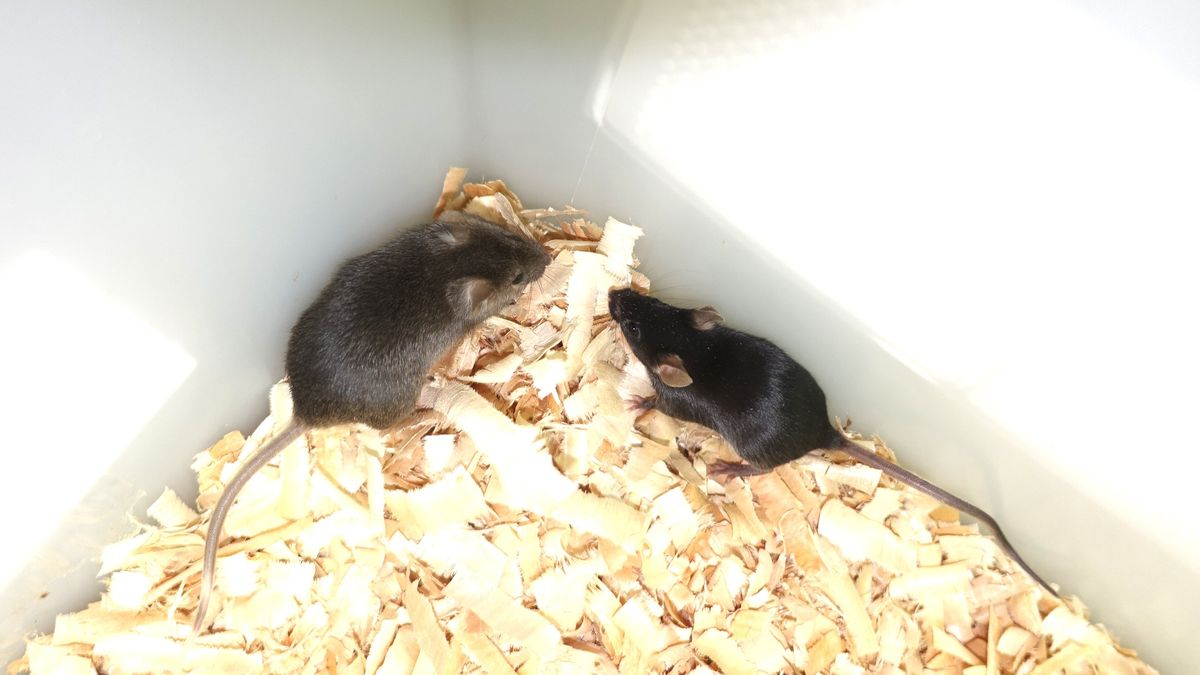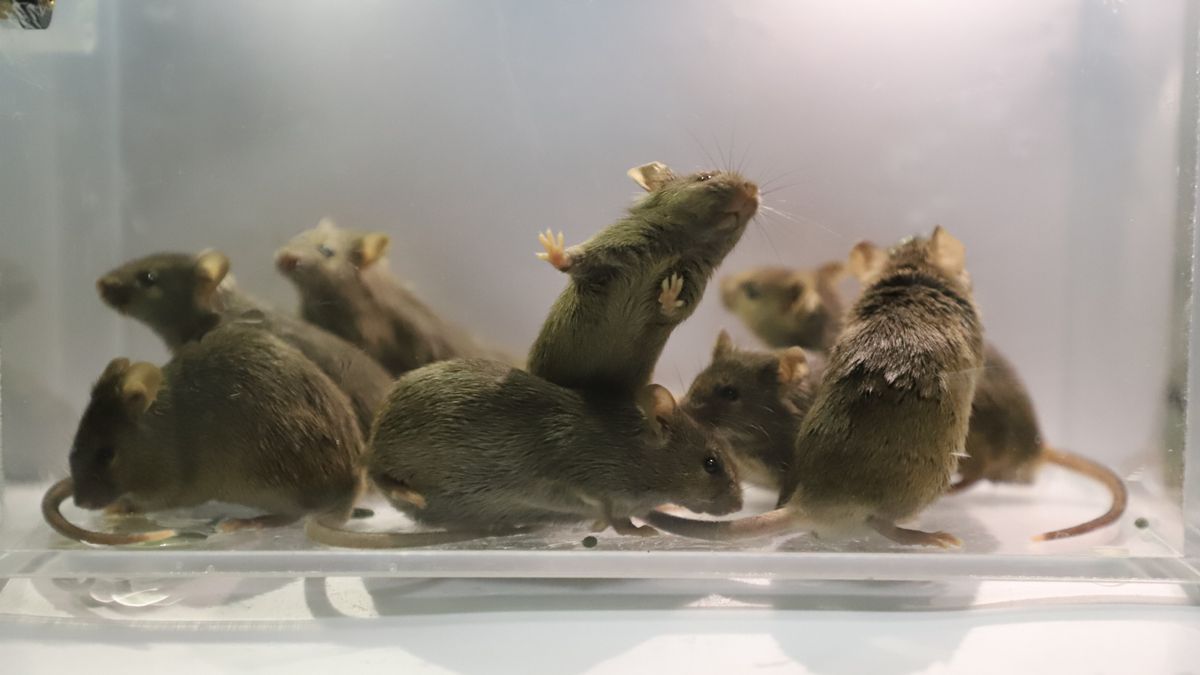Scientists in China have unveiled a new method for breeding baby mice with two male parents, and the resulting babies can survive to adulthood.
This is not the first time scientists have bred mice with two dads; a research team in Japan did so in 2023, using a different approach. In the new study, published Tuesday (Jan. 28) in the journal Cell Stem Cell, scientists not only bred two-dad mice that could live to adulthood, but did so in a way that might shed new light on a complex suite of genes whose activity varies depending on which parent you inherit them from. Problems with these genes, known as “imprinting genes,” can cause a range of disorders in humans, including Angelman syndrome.
“I admire the work — I think it’s an important approach,” said Keith Latham, a professor of animal science and of obstetrics, gynecology and reproductive biology at Michigan State University, who was not involved in the research. “This is another significant step forward in understanding the biology of imprinting,” he told Live Science.
Tweaking “imprinted” genes
In the 2023 study, the scientists in Japan collected skin cells from adult male mice and transformed the skin into stem cells that could be used to grow eggs. Using a clever technique, the team ensured that each of these egg cells carried two X chromosomes — the sex-chromosome pairing typically found in females. The team then fertilized these resulting eggs with sperm from male mice, ultimately generating a small number of offspring whose genes came only from male mice.
Related: 8 animals that have virgin births
The new study, conducted in China, used a different approach to reach a similar result.
The researchers started by removing DNA from an immature egg, or oocyte, taken from a female mouse. They then introduced sperm into the egg in order to grow unique stem cells seen only in embryos. These embryonic stem cells, along with sperm from a male mouse, are then injected into a second egg. This finally gives rise to a fertilized egg that can develop into a mouse pup with DNA from two dads.
As a crucial step, the scientists introduced 20 genetic tweaks into the DNA of the stem cells. These tweaks change the activity of imprinting genes, which are unique in that offspring inherit two copies — one from their mom and one from their dad — but they need only one copy to work. So, in each cell, one copy of each imprinted gene gets shut down while the second copy remains functional.
This process is known as “genomic imprinting,” and when it goes wrong, imprinting disorders emerge, causing problems with growth and development. When you attempt to make embryos with DNA from two dads, you would otherwise face a slew of these imprinting issues because too many paternal genes stay active and no maternal genes are around to compensate.
“Our approach directly targets imprinted genes, which have long been suspected to play a central role in bi-paternal reproductive barriers,” complicating the challenge of generating offspring with two male parents, study co-lead author Zhi-kun Li, an associate professor at the Chinese Academy of Sciences in Beijing, told Live Science in an email.
In a previous study, Li and colleagues tweaked just seven imprinting hotspots, or “loci” in the genome, and produced mouse fetuses that made it through pregnancy, but those mice died after birth, Li said. The mice had abnormalities, such as umbilical hernias, protruding tongues and enlarged internal organs.
Systematically, the researchers pinpointed the genetic origin of each of these issues and introduced more and more genetic tweaks to the mice. With 18 modifications, the mice needed help suckling in infancy but could reach adulthood. With 19 tweaks, they had issues with placental growth in pregnancy but fared better after birth. One additional tweak — making 20, in total — seemed to solve that placenta problem.

Interestingly, imprinting seems to be a bigger issue to overcome with bipaternal offspring than bimaternal offspring, the authors noted in their report. In their previous work, they were able to breed mice with two moms that survived to adulthood with much less genetic tweaking, as have other research groups. Plus, spontaneous parthenogenesis — in which an egg can become fertilized without sperm — sometimes occurs in animals outside the lab.
Still, “it is somewhat surprising that manipulation of only 20 imprinting genes allows relatively normal development of bi-paternal embryos where there are hundreds of imprinting loci in mice,” said Dr. Kotaro Sasaki, an associate professor in the University of Pennsylvania School of Veterinary Medicine and Perelman School of Medicine who was not involved in the work.
However, the resulting mice still had deficits, including shorter lifespans than normal mice, Sasaki told Live Science in an email. Experiments showed the mice were also infertile. By contrast, the handful of mice that were bred in Japan and survived to adulthood were fertile.
“Our next steps include refining the gene editing approach to produce healthier bi-paternal animals,” Li said. It’s likely that additional imprinting genes could be tweaked to help snuff out the remaining health issues, he said. The team also wants to try their approach in additional animal species to see how well it translates.
In the long run, this line of research could help scientists better understand imprinting disorders, potentially paving the way to treatments that use gene editing to fix them in humans, Li suggested.
Latham added that, by better understanding the genetic pathways involved, scientists might be able to identify ways to counter the disorders with drugs, rather than gene editing. He added that there could also be applications for the research in agriculture, if it eventually helped breeders cultivate desirable traits in livestock, for instance.
When it comes to humans, Latham said we’ll want to better understand the risks and benefits of the approach before attempting to use it in people. Sasaki echoed the sentiment, noting that a number of technological hurdles and ethical quandaries “all hamper clinical application in humans in the near future.”

